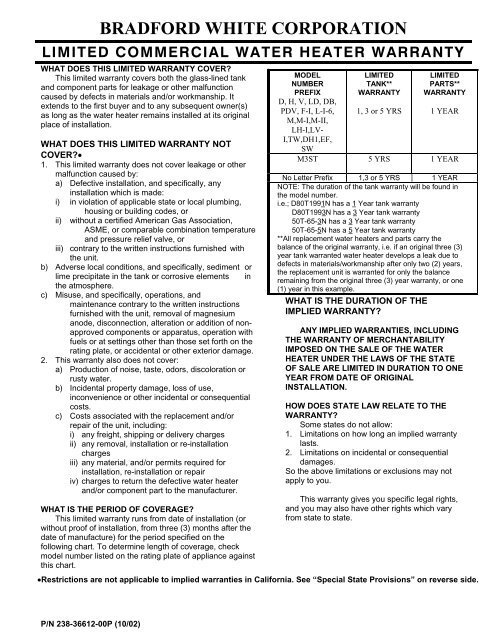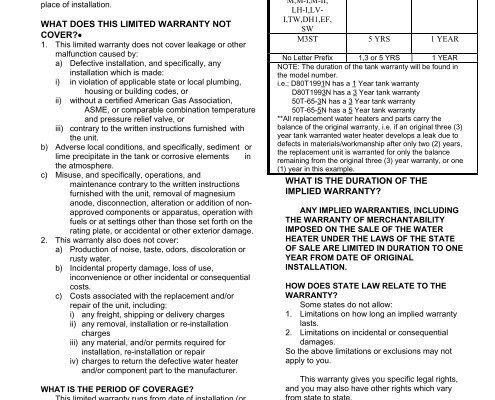
Let me explain. Warranties are supposed to be like a safety net, ready to catch you if something goes wrong. But with used or secondhand products, that net isn’t always in place—or at least not as wide as it was for the first owner. Navigating this stuff can feel confusing, especially with all the rules and fine print. Don’t worry, we’ll walk through it together, step by step, and I’ll help clear up what really happens when you try to register a pre-loved Bradford White water heater for warranty, what your options are, and what you should do if you get stuck.
How Bradford White Water Heater Warranties Actually Work
Before diving into the whole “used” angle, it’s worth understanding how Bradford White’s warranty system is set up to begin with. Honestly, a lot of homeowners never read the warranty paperwork until something breaks. Bradford White, like many other big water heater brands, offers warranties that usually kick in automatically when the unit is first installed by a licensed professional.
Here’s the thing: Bradford White warranties are typically tied directly to the original installation and, often, to the person who bought the water heater first. The warranty clock usually starts ticking from the installation date—not just the purchase date or the date you move in. That means if someone installs a water heater in 2020, the warranty doesn’t reset if it changes hands in 2024.
Another important detail? Bradford White water heaters are almost always sold through licensed contractors or plumbing professionals. This makes a difference because documentation—like proof of installation or the installer’s code—matters a lot when it comes to claims or registering the product.
If you bought a brand new unit through a contractor, the process is simple: it gets registered for warranty based on that original setup. With a used one, it’s not so straightforward, as you’ll see in a minute.
Can You Register a Used Bradford White Water Heater for Warranty?
You might be wondering, “Can I just register a used Bradford White water heater in my name, like you would with a new smart thermostat or a universal remote?” Here’s the answer—plain and simple: *generally, no*. Bradford White’s warranties aren’t transferable. That means if you buy a used water heater (say, from Facebook Marketplace, a neighbor, or even as part of a home purchase), you can’t register it under your own name for a fresh warranty period.
This non-transferable rule is baked right into their warranty terms. Even if you have all the model numbers, codes, and proof of installation, the warranty usually stays with the original homeowner and covers only the original installation site. There’s no “reset” button or code to sync or pair your ownership with the warranty department.
The warranty is meant for the first owner, at the first location, installed by a licensed pro. If it moves—even across the street—it’s out of warranty territory.
So, if you’re eyeing a used Bradford White water heater at a great price, just know: you’re not getting a warranty with it. Most of the time, you can’t start a new registration, and any paperwork from the previous owner won’t help make it official.
What If You’re Buying a Home with a Bradford White Heater Installed?
Let’s say you’re not picking up a used water heater off Craigslist—you’re actually buying a house, and it already has a Bradford White unit installed. Does the warranty stick around in this case? Here’s where it gets a bit tricky.
If the water heater is still at its original installation site (which it almost always is, if it came with the house), some warranties might technically still be valid—but only for the time left from the original warranty period. However, even then, the warranty is designed to cover *the home*, not necessarily the new owner. In practice, Bradford White still considers the warranty as non-transferable.
If you need service or need to make a claim, they’ll want the original installation info, proof of the licensed contractor, and all the original registration info. If you’re missing any of that, your chances of getting warranty help are slim.
So, if you’re house-hunting and see that shiny tank in the basement, don’t get your hopes up for a brand-new warranty just because you have the unit. The best you can do is check if there’s any time left on the original coverage—and see how flexible the manufacturer or your installer might be with supporting you.
Why Manufacturers Don’t Allow Used Unit Registration
You might think, “It seems a bit unfair—why not let the new owner get coverage, too?” Here’s the manufacturer’s side of the story, and honestly, it makes sense once you think about it.
Warranties are a promise based on certain conditions. For water heaters, that includes:
- Proper, professional installation (no DIY jobs that skip important steps)
- Original documentation and codes for tracking
- No tampering, improper moves, or secondhand wear and tear
- Clear knowledge of the appliance’s service history
When a water heater changes hands, moves to a new house, or is re-installed without a pro, all those certainties go out the window. The manufacturer can’t be sure how it was handled, if it was stored properly, or even if it sat in a garage for a year before getting hooked up again. So, for their own risk (and yours), they lock the warranty to the very first owner and install.
It’s a bit like a car’s powertrain warranty only being good if you’re the original owner—after that, you’re on your own.
Are There Alternatives or Extended Warranty Options?
So you can’t register a used Bradford White water heater for warranty. Is there any workaround or backup option? Here’s what you can do.
Check with the installer or your own contractor first. Sometimes, plumbing professionals offer *separate* warranties or service contracts on labor—totally separate from the manufacturer’s warranty. If you’re lucky, and the water heater came as part of a home purchase, you might have some recourse through them.
- Ask the seller or realtor for any paperwork on the water heater.
- Contact the original installer—sometimes they’ll go to bat for you, or at least help with troubleshooting, syncing up service calls, or repairs at a better price.
- Look into third-party home warranty providers; while they won’t “register” your water heater, they may cover failures as part of broader appliances packages.
But be careful—no third-party warranty or service contract truly “transfers” or “resets” a manufacturer’s warranty. If you want the full Bradford White protection, only new, professionally-installed units qualify.
What Happens If You Need Support With a Used Bradford White Water Heater?
Okay, so you’ve got a used Bradford White unit, and something goes wrong—maybe it’s not heating, or the pilot won’t stay lit, or you’re stuck trying to decipher the blinking code panel. Now what?
You’re not totally alone. You can still contact Bradford White’s customer support for help with basic troubleshooting, manuals, or recommended repairs—even if you’re out of warranty. They’ll help you:
- Reset the unit (if a simple reset or power cycle might fix it)
- Decode error codes or blinking lights
- Sync you with a local licensed technician for service
- Point you toward the right replacement parts or instructions
Just keep in mind, you’ll pay out of pocket for any repairs or replacement components—that’s where the lack of warranty really stings.
If replacing the unit entirely is on the table, weigh the cost of a new, *warrantied* Bradford White water heater against ongoing repairs. Sometimes, peace of mind is worth the investment in a new, properly registered heater.
Comparing Bradford White to Other Water Heater Brands
It’s not just Bradford White with this tough stance. Most top water heater brands (think Rheem, AO Smith, or State) have similar rules—warranties are almost never transferable to the next owner. Feels a little like a private club, doesn’t it?
For comparison:
- Some brands offer limited warranty transfers on certain models, but usually only in the first year or so and with a bunch of paperwork.
- Generic or off-brand heaters rarely have generous warranty terms for used units.
- “Universal” warranties or home appliance plans might sound good, but they rarely cover as much as a true manufacturer’s warranty—and they’re often full of exceptions.
So, in general, if a long, robust warranty is your top concern, buying new and getting it installed by a licensed pro is always your safest bet—no matter the brand.
Final Thoughts: What You Should Keep in Mind
So, can you register used Bradford White water heaters for warranty? The truth is, you can’t—at least not in the way people usually hope. The manufacturer’s warranty is meant just for the first owner at the first installation address. This might feel limiting, but it’s how almost every major water heater maker does it.
If you’ve ended up with a used Bradford White water heater, your best move is to focus on good maintenance, ask the seller for as much documentation as you can, and connect with a licensed plumber for any serious issues. And if you’re ready to upgrade or just want full warranty peace of mind, investing in a new, professionally-installed Bradford White model will unlock all the coverage—and support—you need.
At the end of the day, warranties are about managing risk. When in doubt, always check the fine print, ask questions, and don’t be afraid to reach out for help. That way, whether your water heater is brand new or just new to you, you’ll always know where you stand.
